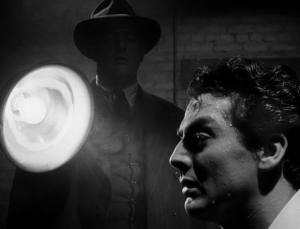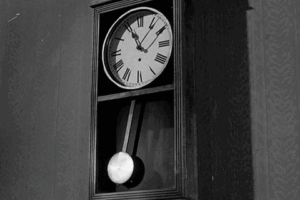So . . . a suspect has finally developed in your great novel . . . the detectives have him cornered in an interview room . . . the lights are low . . . they shine a bright spotlight in the suspect’s eyes to disorient him . . . they are peppering the suspect with rapid-fire questions . . . playing good cop/bad cop . . . yelling . . . threatening . . . maybe even a few slaps on the jaw . . . he’s about to crack . . . he’s gonna tell your readers where he buried the body . . . you get the picture.

Suddenly, the suspect blurts out “I want my Miranda rights!”
WTF just happened?
Whoosh. He just popped your balloon.

We’ve all heard these rights on television. You have the right to remain silent. Anything you say can and will be used against you in a court of law. You have the right to have an attorney present during questioning. If you cannot afford an attorney, one will be provided to you at no cost. You have the right to waive your Miranda rights and speak to us without an attorney present.
And you as a writer have the right to know the cold hard truth about Miranda rights.
What has happened is that he has invoked his rights under the 1966 U.S. Supreme Court decision of Miranda v. Arizona, where a convicted rapist, Ernesto Miranda, gave the police a written confession, then appealed his conviction on the grounds he did know he was entitled to have a lawyer present even if he could not afford one during his interrogation. It is one of the most important, yet misunderstood legal decisions when it comes to writers who are incorporating the law and confessions into their work, whether it be a mystery, romance, true crime, historical, suspense or anything in-between. By invoking his Miranda rights, he no longer has to talk to the police. And they can’t force him to. Legally, that is.
Why is it so very important for you as a writer to know about Miranda?
It’s extremely important because if you are inaccurate in the use of Miranda by the police or the suspect in your work, you lose immediate credibility from those readers that understand the law. There are a lot of lawyers, police officers, legal scholars, paralegals, prosecutors, judges, court clerks, defense attorneys, law students, court stenographers, parole officers, federal agents, probation officers and others in the criminal justice system out there. And they like to read. Then there are the other readers not in the field who do not understand Miranda, accept your misinformation, and later on find out you were inaccurate.

They’ll never buy your books again. You lied to them. Under oath. Guilty! Your sentence: ten years in the 75% off book bin at Sam’s Club or COSTCO. Right next to the little old lady that gives away the free samples of miniscule meatballs on a toothpick.
Knowing EXACTLY when and where Miranda is used is what I am going to clue you in on, because you and your faithful readers have the right to know.
True or false? A police officer must give Miranda rights to every suspect before they interview them about a crime.
FALSE!
The U.S. Supreme Court has interpreted that Miranda only needs to be given to a person when they are actually physically under arrest, or if a person “reasonably believes” he is either not free to leave or is under arrest. But, I have read many books where this is not used correctly. I don’t read those authors anymore. They didn’t do their homework.
Example: Police officers go to a suspect’s home. They take him in their car to the police station, but he is not handcuffed. They bring him into an interview room. There are two officers, one stands by the closed door to the room, the other at the interview table. Would a reasonable person feel they were not free to leave? Yes, according to the courts. Why? He has no car to drive home, the officer is blocking his path, and the door is closed. So, if the officers interview him, and he confesses to a crime, but they have not given him his Miranda rights, the confession can be inadmissible in court, and any and all information the suspect offered is no good, part of the “fruit of the poisonous tree” doctrine. In other words, if the confession is inadmissible, then everything obtained from it is inadmissible as well.
Example: Police officers go to a suspect’s home. They ask him to meet them at their headquarters. The suspect drives himself there, and the interview is conducted in a room with the door open and both officers seated next to him. Would a reasonable person feel he was not free to leave? No, the courts have decided. Why? He drove himself to the police station. They are not blocking his path. The door is open.
Example: Police officers go to a suspect’s home. He refuses to go with them or drive himself to the police station. He is handcuffed. Clearly, he is under arrest, so Miranda rights must be given to him.
What does this all mean for your characters, your plot and your story?
TONS!
Now that you know the truth, the whole truth and nothing but the truth about Miranda, you can have some fun in your story. Perhaps have an inexperienced police officer fail to give Miranda warnings when needed. Your suspect confesses. Evidence is found. The sharp defense attorney has the confession thrown out of court. The case is dismissed. The victim’s family explodes in court.
The suspect is set free. He goes on to commit more crimes. The town screams “injustice!” Look what you did. You created tension. Excitement. Passion. All by knowing the facts about Miranda. Are you the best or what?

You could have the officers do the interview with a closed door. Or some officers blocking the path out. How about the door being open? Maybe the officers set up an all you can eat buffet in the interview room. With a wet bar. A chocolate fountain would be sweet (literally). Heck, they might even send a stretch limo for the suspect to come down to headquarters. Mix it up and have fun. There are a lot of red herrings here to entice your adoring fans, but it is all because you know just exactly when and where to have your officers use or not use Miranda.
All rise.
Quiet in the courtroom.
The jury has just returned with their verdict.
You’re GUILTY . . . of now being a better writer.
Besides, you didn’t really want to be next to those miniscule meatballs anyway.





